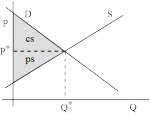This paper shows that implicit assumptions about the numeraire good in the Kaldor–Hicks efficiency–equity analysis involve a ‘‘same-yardstick’’ fallacy (a fallacy pointed out by Paul Samuelson in another context), a special case of the Petitio Pricipii fallacy.
On a fallacy in the Kaldor-Hicks efficiency-equity analysis
This paper shows that implicit assumptions about the numeraire good in the Kaldor-Hicks efficiency-equity analysis involve a “same-yardstick” fallacy.
Mathematics of Real Estate Appraisal
This paper on the math of real estate appraisal is my most downloaded paper on the SSRN site! Hence I might as well make it available here too. It is a long discourse on the mathematics of compounding and discounting.
The Fatal Flaw in Cost-Benefit Analysis
In Part I of this commentary on the Sarkozy-Stiglitz Commission on the Measurement of Economic Performance and Social Progress, the focus was on the social engineering perspective underlying the search for such an index. But at the end of that commentary, I noted that the Commission’s discussion of different indices was rather “academic” since there is one dominant index used in governmental decision-making: the monetized gains minus the monetized losses of cost-benefit analysis. A proponent of cost-benefit (CB) analysis would roll up all the Commission’s discussion into the question of the better “costing out” of all the direct and indirect impacts of a social decision.

